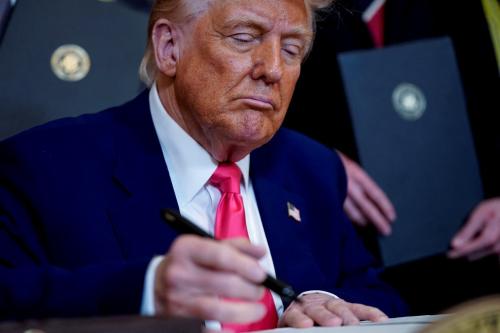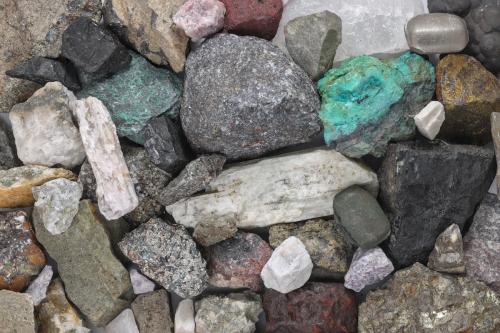Tony Blair’s first visit to the United States as Prime Minister was in June 1997, to attend the G8 Summit in Denver and an environment conference in New York. On the first day of the environment conference, Blair met with Vice President Al Gore, who opened their meeting by offering Blair tea or coffee. When Blair chose coffee, Gore—making small talk—said he was surprised to find an Englishman prefer java. “Better coffee,” Blair shot back, with a half-smile, “than suffer through a cup of American tea.”
The quick riposte is a Blair trademark. So is Blair’s willingness to challenge his American friends on the environment—in particular on global warming. During his 1997 visit, Blair delivered a high-profile speech with a thinly-veiled criticism of “great industrialized nations” that fail to reduce greenhouse gas emissions. Six years later, Blair stood before a joint session of Congress and told American legislators that climate change “cannot be ignored,” insisting “we need to go beyond even Kyoto.”
Blair will have another opportunity to press his point this week, as he hosts President George W. Bush for a state visit. The visit gives Blair a superb opportunity to showcase his government’s serious and successful efforts to reduce greenhouse gas emissions. Protestors carrying signs decrying the man they call the “Toxic Texan” will provide a constant reminder that Iraq is not the only issue on the minds of the British public.
But breaking through will not be easy. Bush has shown little if any interest in global warming, dismissing an EPA study warning of droughts, floods and rising sea levels as a “report put out by the bureaucracy.” To the extent he has paid attention, Bush has aligned himself with the skeptics on this issue, opposing bipartisan domestic measures to reduce greenhouse gas emissions and failing—after almost three years in office—to suggest a path forward in the international negotiations.
How could Blair best engage President Bush on global warming? Here are three suggestions:
First, Blair should take President Bush on a factory tour. Why visit smokestacks? Because Blair could choose a factory owned by one of the many companies (such as Rolls-Royce, British Sugar, Dupont and Budweiser) participating in the UK Emissions Trading Scheme—an innovative program that offers financial rewards to those who deliver the biggest emissions cuts. Blair could let a senior executive explain how the company is making money by cutting greenhouse gas emissions.
Second, at the official state dinner, Blair should seat Bush between Sir Philip Watt, CEO of Royal Dutch Shell, and Sir John Browne, CEO of BP. These two oil company CEOs would deliver a rather different message on global warming than Bush usually hears. Watt has said “we are entering a particularly innovative period in energy technology” and that his company “stand[s] with those who are prepared to take action” on global warming. Browne often says the scientific evidence on global warming is strong enough take action. And although neither company has been free of environmental controversy, Shell and BP have both cut greenhouse gas emissions sharply—indeed by amounts greater than would be required of the United States under the Kyoto Protocol.
Third, when the doors are closed, Prime Minister Blair should deliver a firm message to President Bush. He should say:
“I know that this issue creates political problems for you. But everything you want to do in the world is made more difficult by your government’s refusal to take global warming seriously. Your superb speech on spreading democracy in the Arab world fell flat because, as others have said, you offered moral clarity without moral authority.
“There are many reasons for this, but let me be blunt. The United States will never have moral standing in the eyes of millions of people around the world so long you have 4% of the world’s population and emit 25% of the world’s greenhouse gases, yet aren’t doing anything serious to address the problem.
“The good news is that this is going to be a lot cheaper and easier than some of your advisors seem to think. Your father helped pioneer a market-based approach to fighting pollution known as emissions trading. It worked splendidly in the United States in fighting acid rain and now we’re trying it in the fight against global warming. In the UK, we’ve cut emissions faster than expected, partly because we’ve sent clear signals to industry, who have begun to respond.
“Besides, and not to meddle, but have you noticed that your position on this issue seems more and more out of step with leaders of your own party? Governors Pataki and Schwarzenegger—Republican governors of your two largest states!—both support serious measures to address global warming. Senator Richard Lugar, chair of your Foreign Relations Committee, recently joined 42 other Senators in voting for binding limits on greenhouse gas emissions.
“I’ve stood with you on some very unpopular issues. It’s time we worked together on this topic, too.”
Who better than Tony Blair to help George Bush see the fight against global warming as an opportunity, instead of a cup of bitter tea?
The Brookings Institution is committed to quality, independence, and impact.
We are supported by a diverse array of funders. In line with our values and policies, each Brookings publication represents the sole views of its author(s).



Commentary
Op-edTony Blair and Global Warming
November 18, 2003